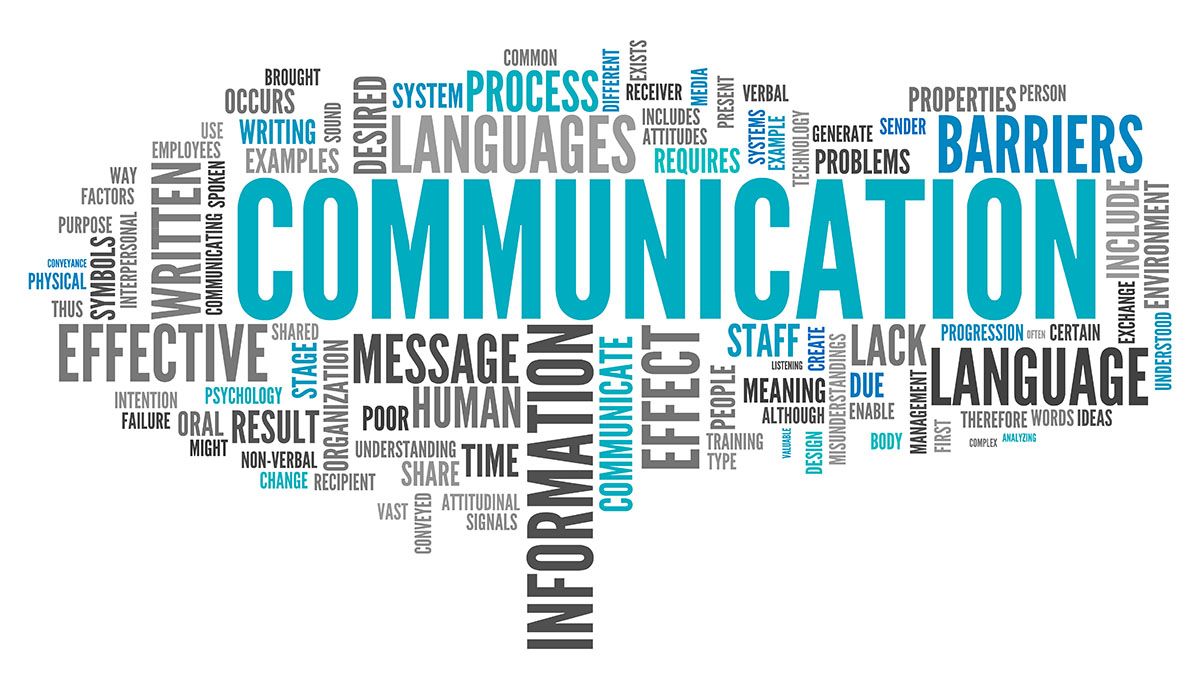Improve Communications Skills
Improve Communications Skills
Improve Communications Skills


Improving Your Communications Skills Matters
Good business communication skills are a key factor in every aspect of your career – from being hired, closing a sale, working well within your organization to earning a promotion or finding a better job. Here’s examples of soft skills to help you in your career. Or,access the communications skills guide for 2022 here.
Even if you outperform in every other area, being marked poor in communications may greatly reduce your likelihood of career advancement.
Practicing good communication skills on an ongoing basis can help you develop professionally and reach your business goals.
How to Improve Your Communications Skills
Steps to Improve Your Communication Skills
The following five steps are critical to kick-start your learning in communication and interpersonal skills. Set aside time (e.g. one step per week or month) to take action.
Listen
If you want others to listen to you, you must start by listening to them. We have two ears and one mouth for a reason, and we need to use them in that ratio. It’s cliché, but true.
Imagine having a brilliant, well articulated solution to the wrong problem, all because you misunderstood what your boss wanted. Most people know in theory to listen – we just need to remember to actually do it. Actively listening is the first step to effective communication.
So What
Every slide, every voicemail, conversation, or email must have a so what in it. A so what is your summary of:
- Why you are talking or writing to a person or group of people
- Why they should listen
- What is your conclusion
- What you want your audience to do as a result of your communication.
You should articulate your “so what” early on. On a couple of C-suite encounters, we were told that if we don’t say what we need in the first 10 – 15 seconds of a voicemail to a manager or partner, he or she will most likely delete it without listening to the rest. Most people are busy, so when you communicate, know your key points and get to them early.
Set Context
Have you ever called a friend, launched into full detail about something, and a few minutes later they ask, “Wait, back up. I’m lost. What are you talking about?” We have all done it, and we often do this at work.
We are so immersed with our work that many times we launch into a business conversation without providing any background or context. Unlike our friends, however, co-workers and bosses don’t always tell you that they are lost and don’t know what you’re talking about. They will either pepper you with frustrating questions based on their own assumptions, or they’ll be completely detached and won’t hear anything you say.
When you set the context, you’ll sound much clearer to them. As a rule, default to providing context for what you’re talking about. Even if you think they should already know it, don’t assume that they remember.
Structure/Simplify
We rarely talk in bullet points, because it’s not natural. In business, however, it’s important to have structure. Using bullet points is the simplest structure that will help your audience understand you quickly, and they give a marker as to where you are in your communication. Verbally, using bullet points sounds like this: “There are three reasons why we should do x y z. First, xxx. Second, xxx. Lastly, xxx.”
Two to five bullets is the magic range; McKinsey consultants usually error on the side of three bullets. Most humans cannot remember more than three things at once, anyway.
Also, it’s important to keep your communication simple — just because you have a lot of detail, doesn’t mean you should include everything. It will be too overwhelming, and your listeners will get lost. Keep it simple, and communicate only what you need to support your so-what statements.
Story is Best
This is especially true for presentations and job interviews. You’ll be remembered if you tell a good story, instead of just dull out cold facts and logical reasons.
People are inundated with information every day, and it’s hard to remember much or stay interested for very long. Guy Kawasaki, in his book Reality Check, said that your job in a presentation is to entertain, and if they learn something as a result – even better.
Those who tell stories make people want to listen, and they are remembered for that reason. So, next time you are going to present or need to influence a major decision, ask yourself — “What story am I going to tell?”
These communication skills take time to develop, but what’s really important is that you can start today. Imagine having the ability to influence any audience to want to listen and respond to you. We can all do it with practice.

What are Interpersonal Communication Skills
Common definition for “communication”: “the process that we use to communicate our ideas, thoughts, and feelings to another person.” Though we agree with this definition, we find it a bit vague.
Here’s a modification: Interpersonal communication is the process we use to build relationships with others through communication by effectively doing the following:
Understanding the other’s situation
In order to build a relationship with someone, we need to be aware of where the other person is coming from.
Communicating in the right manner
It’s not just what we say that matters but also the tone we use and how we say it. Additionally, by considering our understanding of the other person, we figure out how to best our intentions and ideas to that particular individual.
Influencing them to listen and/or take action as needed
People are more likely to listen to us when we listen first to them and make efforts to establish common grounds. When we approach any communication with the intention to create a win-win situation, that’s when we will maximize our influence on others and inspire them to action.
At the end of the day, the purpose of communication is to reach a common understanding, build a better relationship, and/or agree on what to do next if action is required.

3 Most Common Myths about Interpersonal Communication
Myth #1
Only focus on the facts: Facts are important in a conversation but can’t be the only focus. Often we spend too much time figuring out what facts we want to communicate and too little time on how we want to communicate them. Every person we speak to is human with insecurities, ambitions, and biases. So remember the common adage: “It’s not what you say, but how you make people feel that matters.”
Myth #2
If I’m right, I can say so: It’s never a good idea to kick someone when they’re down. If someone on your team makes a mistake, communicate that but focus the conversation more on where to go from there and allow them to recover. If your customer overbilled you, you still don’t want to overstep in your communication. Approach the situation gently and patiently. It’s always better for the relationship if you give others the benefit of the doubt.
Myth #3
Sugarcoat bad news: Bad news like a layoff message or a message to your boss about a mistake you made at work is difficult to deliver. It’s important to deliver the message tactfully, but this is not the same as sugarcoating. Sugarcoating implies being not direct or clear about the gravity of the message. While sugarcoating a message may make you feel more comfortable, it could confuse the other person or make the listener feel patronized. Sincerity and a focus on moving forward will help more. Whatever happened already happened. So be straightforward and focus on next steps.
Interpersonal Communication Skills are More Important than Hard Skills (Some examples)
Have you ever wondered why having the best answer to a business problem sometimes makes no impact at all? In school, we were always incentivized to give the best answer – the best answer leads to good grades, which lead to job offers. So, naturally we brought that mentality to work. We would work tirelessly to get the perfect, best answer, but were often disappointed when nobody seemed too interested in hearing it.
However, the best answer is not as good as a practical answer that has executive buy-in and champions who are willing to implement the solution.
This is just one example of why interpersonal skills are more important than hard skills. We think of hard skills as what it takes to develop the perfect solution to a business issue. We define interpersonal skills as our ability to build relationships with others, to effectively understand their circumstances, communicate our proposed solution based on their business reality, and persuade them to take action. Only when we combine soft skills, like interpersonal skills, with our hard skills can we become more effective in business.
View some examples of interpersonal skills. Here’s another example of why interpersonal skills are more important than hard skills:
One of our colleagues was assigned a new dentist but at the same office as the old one. As soon as the dentist started examining her, she started “scolding” them for waiting too long on a cleaning (it’s been a year) and not flossing enough. It made them tense, but they said nothing.
Then she told them that they may have the beginnings of cavities on three teeth (no actual cavities yet), and she started scolding them again for waiting too long to get a cleaning. After “scolding” them three times, they asked her to stop repeating herself. After the cleaning, they promptly told the front desk to always give them their old dentist for future appointments, even if they have to wait longer to get an appointment.
Was their cleaning well done this time? Yes. Did the new dentist give them the best diagnosis? Probably. The dentist had all the hard skills to give them their best, but it left our colleague with a “bad taste” in her mouth because of her interpersonal skills. People don’t want to feel stupid or wrong during a business transaction, even if they were.
The business world is not too different. People and companies value good customer experience, practical solutions, and tactful communication methods. We may think that business decisions are made mainly based on logic, but that would be a naïve assumption. Here are three more examples about interpersonal skills which illustrate their importance in business:
Major deals are signed on golf courses
Why are so many deals negotiated on golf courses? Interpersonal skills are used to build close relationships (through a common interest, like golf), and the trust built using these interpersonal skills lead to signed deals. Another, more subtle reason, has to do with the role of body language and negotiation skills.
All logical factors being equal (like price, convenience, delivery time, etc.), people usually choose the vendor with groups that they’ve had good experiences with
Sometimes, people will even choose a higher price with their current vendor because they value the existing experience, rather than wanting to risk having a bad experience with a new, lower priced one.
A mediocre solution that has executive buy-in will get implemented over a more perfect solution created in a black box
This is the lesson I learned in consulting: It’s great to be smart (hard skills), but if I don’t have the interpersonal skills to understand my clients, what’s practical to implement in the company’s current circumstances, and how to best persuade them to take action, I will not be able to make any impact.
These examples all teach an important lesson, especially for those with exceptional hard skills, like engineers, programmers, accountants, scientists, etc.

Soft Skills: Improve Communications Skills Articles
9 Most Important Business Communication Skills
Managing Millennials and Gen Zs begins with focusing on understanding the unique strengths & challenges they bring to the workforce and to management.
How to Manage Millennials and Gen Z on Your Team
Managing Millennials and Gen Zs begins with focusing on understanding the unique strengths & challenges they bring to the workforce and to management.
4 Principles of Interpersonal Communication Skills
Interpersonal communication is an important skill across all facets of your career. The first step in improving it is understanding these 4 principles.
How to Improve Negotiation Skills – Watch the Body Language
There are many opportunities to use soft skills to negotiate at work. Not only can you negotiate during major career milestones like job offers and promotions but you can also negotiate in many other ways.
3 Self-promotion Ideas
updated 6/29/2022: How to finesse self-promotion at work without coming off too boastful or self-centered is tricky. Here are 3 self-promotion ideas that are subtle and effective.
5 Soft Skill Tips on How to Ask for Help at Work
How do you ask for help at work when in need? Here are five tips on how.
5 Simple Ways to Improve Communication Skills
How do you start to improve your communication skills? Here are five steps you can take today.
Real World Examples of Interpersonal Communication Skills
Some real world examples of interpersonal communication skills to help you improve your business communications skills from our resident executive leaders.
Five Qualities of A Good Mentor
We all need good mentors to help guide us in our career and life, but not all mentors are created equal. Read about five qualities a good mentor should have.
Being Right Is Not Enough from a Soft Skills View
When developing your soft skills, being right is never enough if the goal is to convince people to buy in to your position on something. Here's a quick case study on this soft skills approach.

